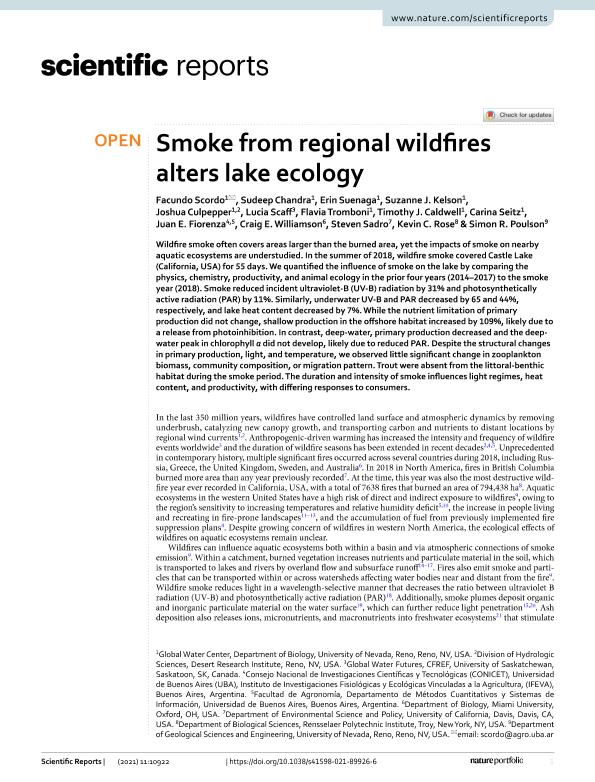Artículo
Smoke from regional wildfires alters lake ecology
Scordo, Facundo ; Chandra, Sudeep; Suenaga, Erin; Kelson, Suzanne J.; Culpepper, Joshua; Scaff, Lucia; Tromboni, Flavia; Caldwell, Timothy J.; Seitz, Carina
; Chandra, Sudeep; Suenaga, Erin; Kelson, Suzanne J.; Culpepper, Joshua; Scaff, Lucia; Tromboni, Flavia; Caldwell, Timothy J.; Seitz, Carina ; Fiorenza, Juan Esteban; Williamson, Craig E.; Sadro, Steven; Rose, Kevin C.; Poulson, Simon R.
; Fiorenza, Juan Esteban; Williamson, Craig E.; Sadro, Steven; Rose, Kevin C.; Poulson, Simon R.
 ; Chandra, Sudeep; Suenaga, Erin; Kelson, Suzanne J.; Culpepper, Joshua; Scaff, Lucia; Tromboni, Flavia; Caldwell, Timothy J.; Seitz, Carina
; Chandra, Sudeep; Suenaga, Erin; Kelson, Suzanne J.; Culpepper, Joshua; Scaff, Lucia; Tromboni, Flavia; Caldwell, Timothy J.; Seitz, Carina ; Fiorenza, Juan Esteban; Williamson, Craig E.; Sadro, Steven; Rose, Kevin C.; Poulson, Simon R.
; Fiorenza, Juan Esteban; Williamson, Craig E.; Sadro, Steven; Rose, Kevin C.; Poulson, Simon R.
Fecha de publicación:
25/05/2021
Editorial:
Nature
Revista:
Scientific Reports
e-ISSN:
2045-2322
Idioma:
Inglés
Tipo de recurso:
Artículo publicado
Clasificación temática:
Resumen
Wildfire smoke often covers areas larger than the burned area, yet the impacts of smoke on nearby aquatic ecosystems are understudied. In the summer of 2018, wildfire smoke covered Castle Lake (California, USA) for 55 days. We quantified the influence of smoke on the lake by comparing the physics, chemistry, productivity, and animal ecology in the prior four years (2014?2017) to the smoke year (2018). Smoke reduced incident ultraviolet-B (UV-B) radiation by 31% and photosynthetically active radiation (PAR) by 11%. Similarly, underwater UV-B and PAR decreased by 65 and 44%, respectively, and lake heat content decreased by 7%. While the nutrient limitation of primary production did not change, shallow production in the offshore habitat increased by 109%, likely due to a release from photoinhibition. In contrast, deep-water, primary production decreased and the deep-water peak in chlorophyll a did not develop, likely due to reduced PAR. Despite the structural changes in primary production, light, and temperature, we observed little significant change in zooplankton biomass, community composition, or migration pattern. Trout were absent from the littoral-benthic habitat during the smoke period. The duration and intensity of smoke influences light regimes, heat content, and productivity, with differing responses to consumers.
Palabras clave:
SMOKE
,
WILDFIRE
,
LAKE ECOLOGY
Archivos asociados
Licencia
Identificadores
Colecciones
Articulos(IADO)
Articulos de INST.ARG.DE OCEANOGRAFIA (I)
Articulos de INST.ARG.DE OCEANOGRAFIA (I)
Articulos(IFEVA)
Articulos de INST.D/INV.FISIOLOGICAS Y ECO.VINCULADAS A L/AGRIC
Articulos de INST.D/INV.FISIOLOGICAS Y ECO.VINCULADAS A L/AGRIC
Citación
Scordo, Facundo; Chandra, Sudeep; Suenaga, Erin; Kelson, Suzanne J.; Culpepper, Joshua; et al.; Smoke from regional wildfires alters lake ecology; Nature; Scientific Reports; 11; 10922; 25-5-2021; 1-14
Compartir
Altmétricas



